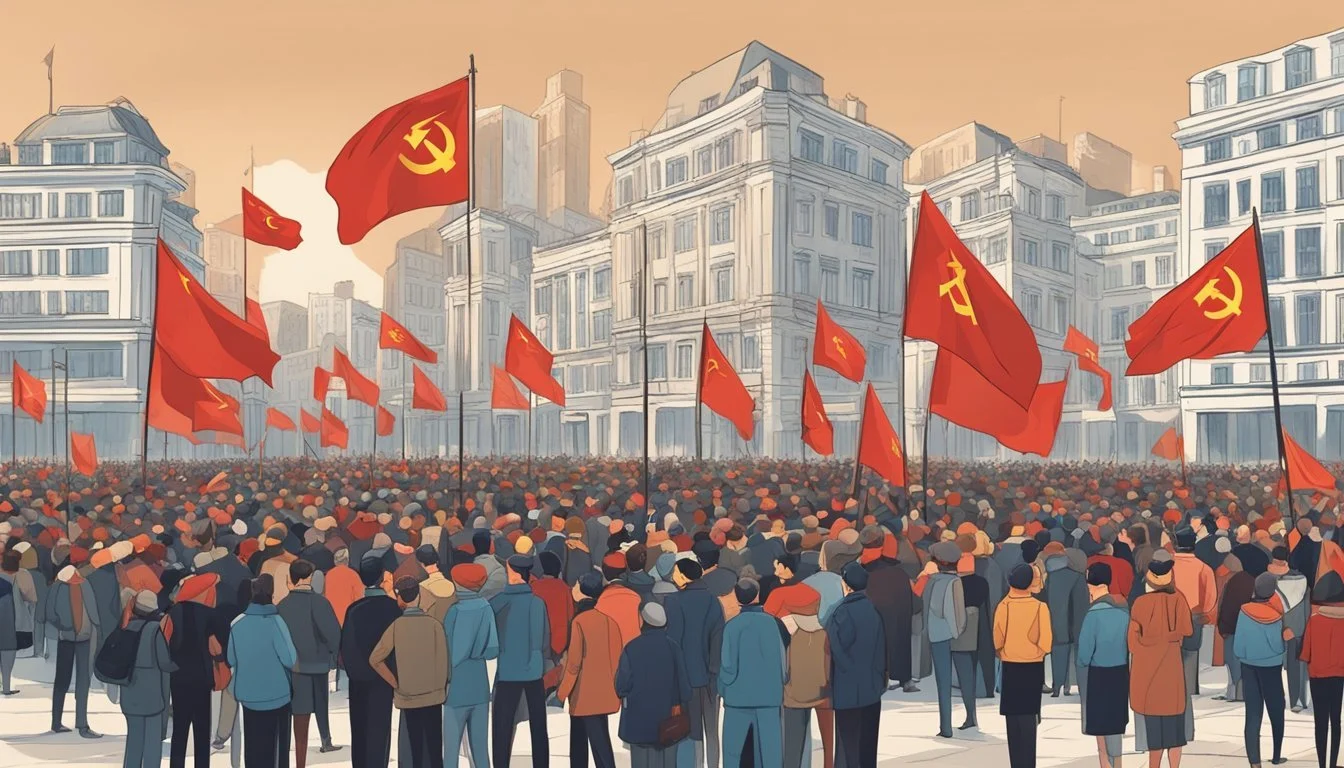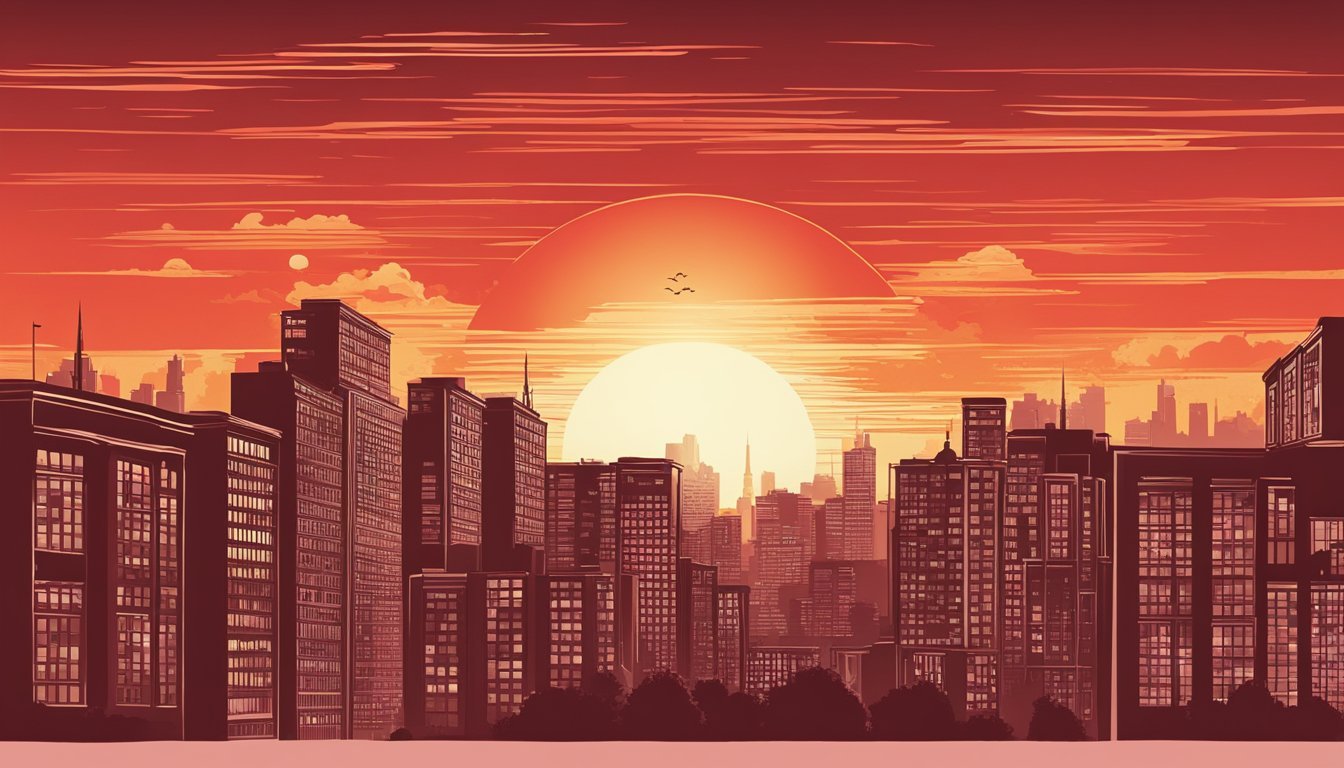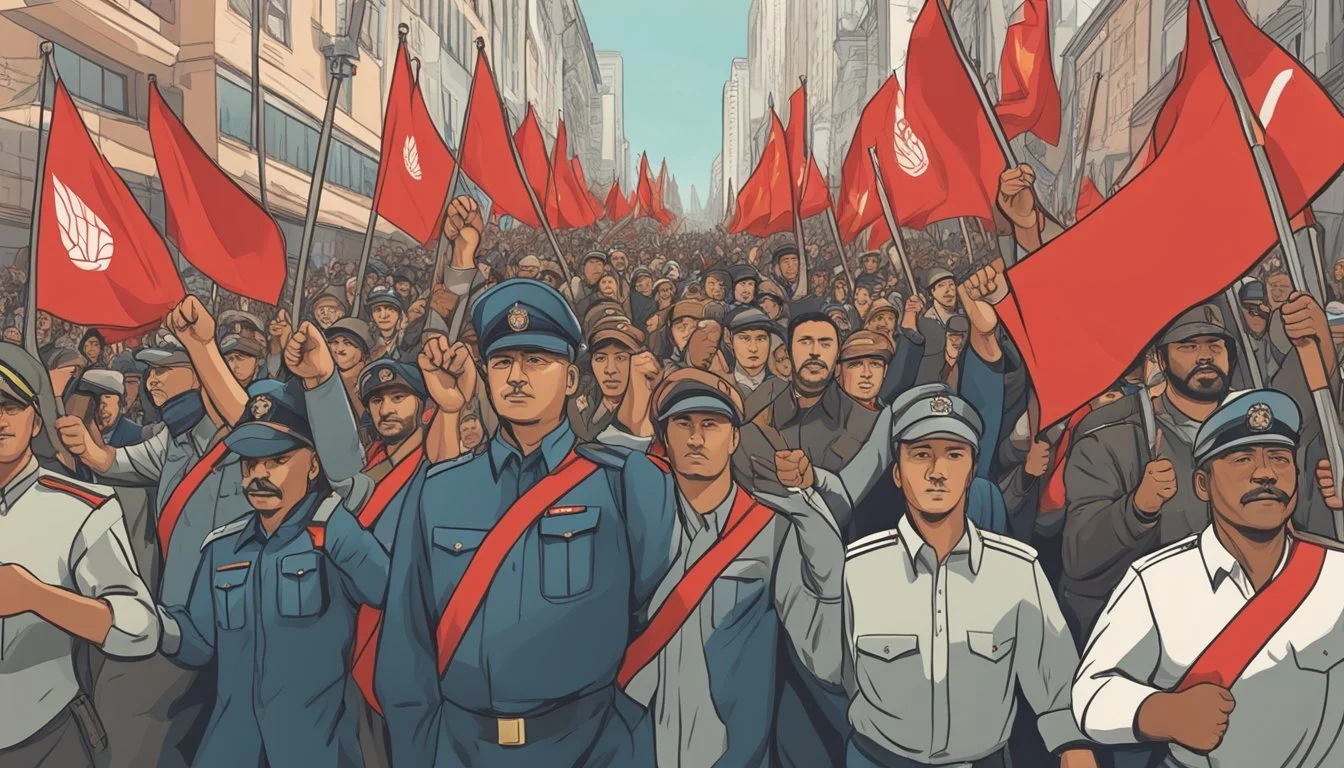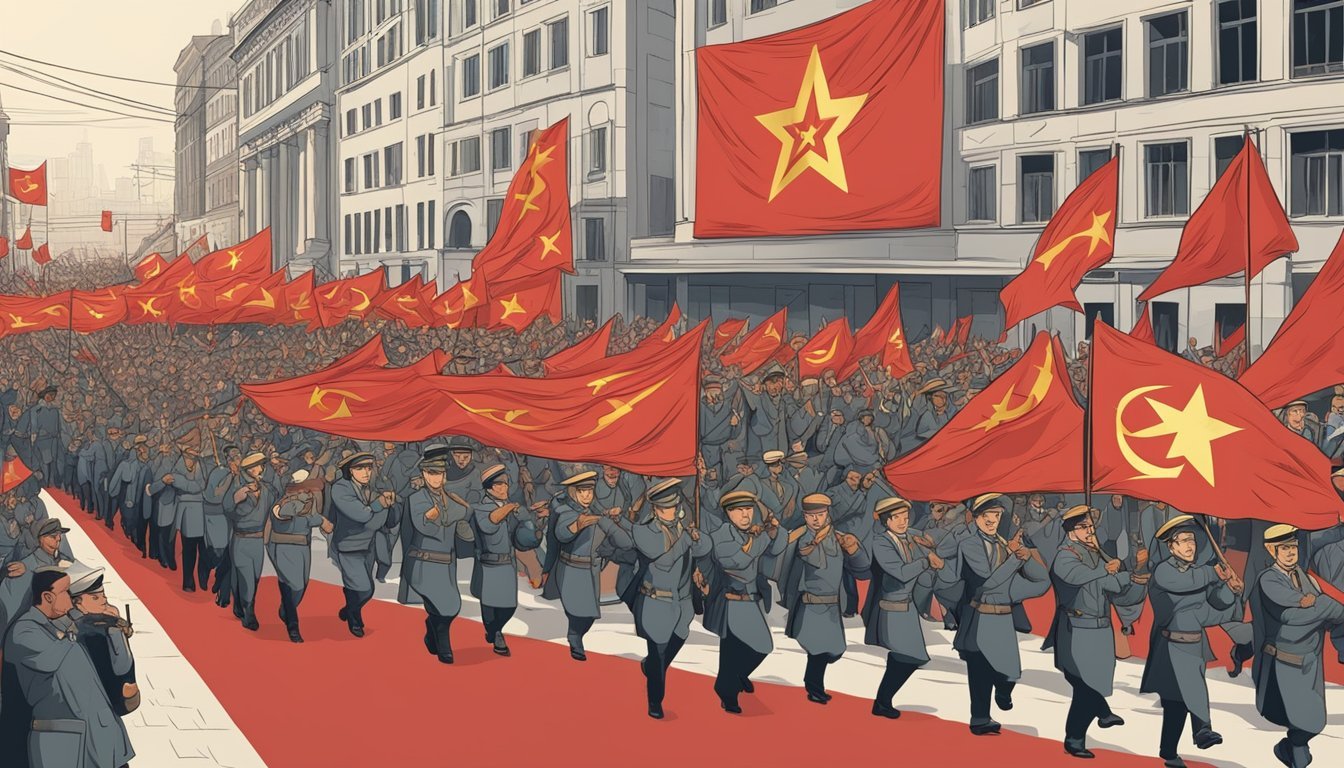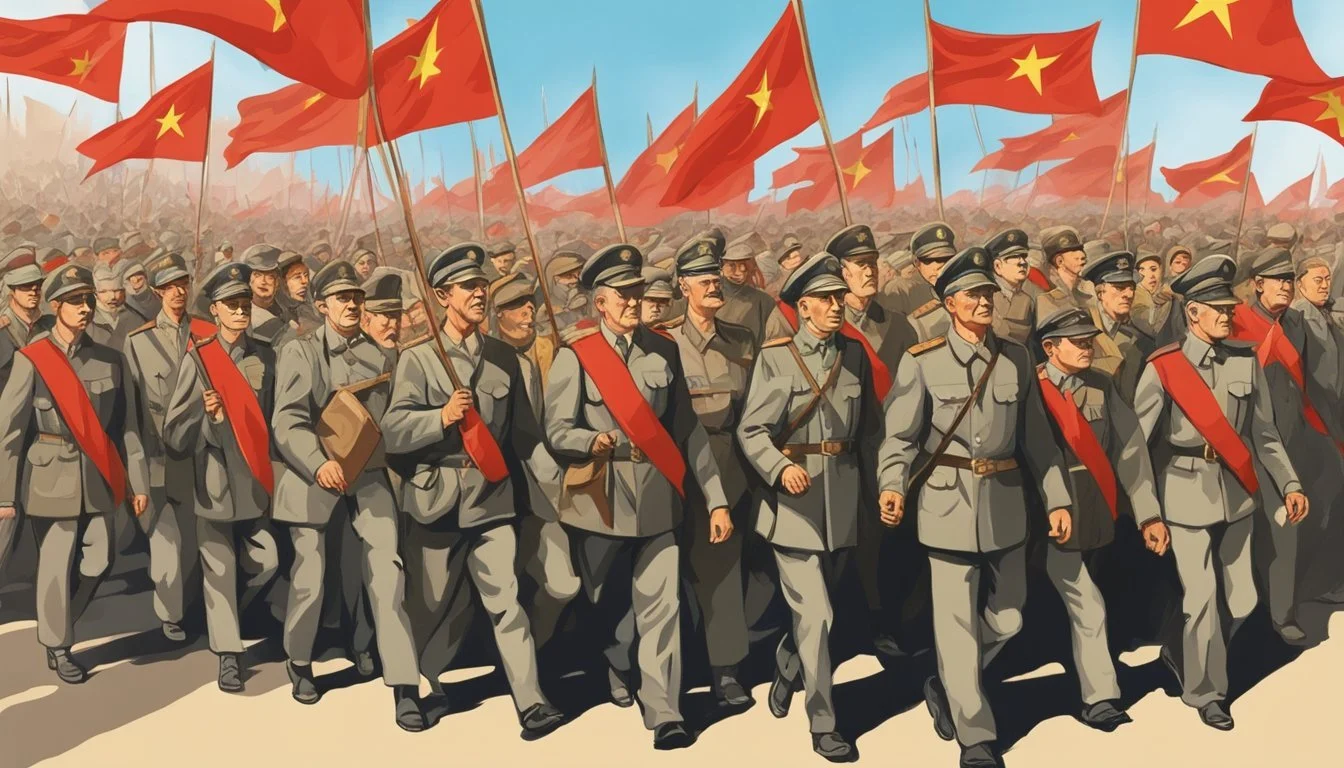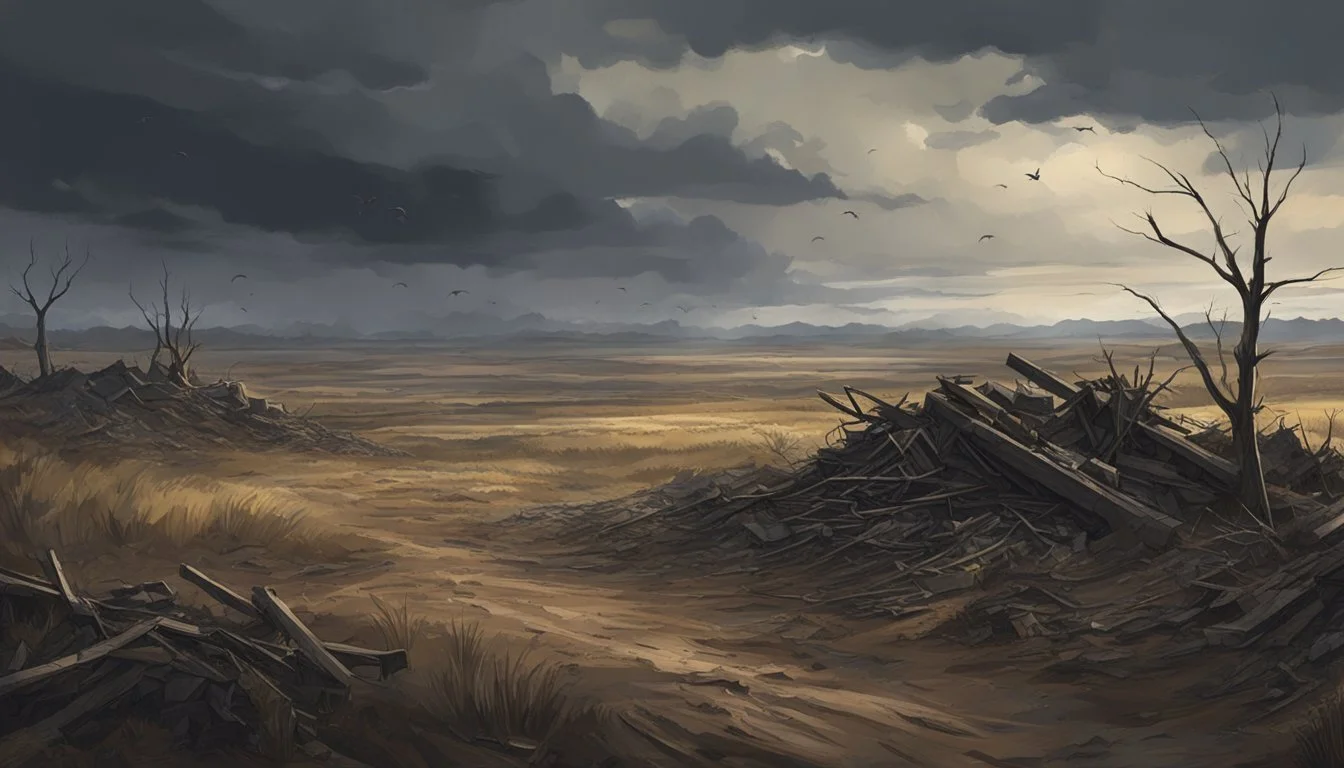9 Documentaries on the Rise of Communism in the 20th Century
A Historical Exploration
The 20th century witnessed a seismic shift in global politics with the rise of communism. This ideology, rooted in Karl Marx's theories, spread across continents and shaped the course of history. Documentaries exploring this phenomenon offer viewers a window into the complex factors that led to communism's ascendance and its profound impact on societies worldwide.
From the Russian Revolution to the fall of the Berlin Wall, filmmakers have chronicled the key events and figures that defined the communist movement. These documentaries provide historical context, personal narratives, and expert analysis to help audiences understand this pivotal era. By examining the rise of communism through various lenses, these films contribute to a deeper understanding of 20th-century geopolitics and social change.
1) 'The Soviet Story' by Edvīns Šnore
'The Soviet Story' is a 2008 documentary film directed by Latvian filmmaker Edvīns Šnore. The film examines the history of the Soviet Union and its relationship with Nazi Germany before and after 1941.
Šnore's documentary features interviews with prominent historians, including Norman Davies and Boris Vadimovich Sokolov. It also incorporates archival footage and documents to support its claims.
The film explores controversial topics such as the Soviet-German collaboration, the Ukrainian famine of 1932-1933, and Soviet mass killings. It presents these events as deliberate acts orchestrated by the Soviet regime.
'The Soviet Story' was sponsored by the Union for Europe of the Nations group in the European Parliament. This support allowed Šnore to access resources and conduct extensive research for the project.
The documentary has gained attention for its provocative stance on Soviet history. It challenges commonly held perceptions about the USSR's role in World War II and its treatment of its own citizens.
Critics have praised the film for shedding light on lesser-known aspects of Soviet history. However, some have questioned its objectivity and interpretation of historical events.
2) 'Red Dawn' by Patrick Swayze
'Red Dawn' is a 1984 American action film starring Patrick Swayze. Set in a fictional version of World War III, it depicts a Soviet invasion of the United States. The movie follows a group of teenagers who form a guerrilla resistance group called the Wolverines.
Patrick Swayze plays Jed Eckert, the leader of the young insurgents. The film explores themes of patriotism, resistance, and survival in the face of communist occupation. It portrays the teenagers' transformation from high school students to determined fighters.
'Red Dawn' gained cult status for its intense action sequences and Cold War-era narrative. The movie's depiction of asymmetrical warfare offers insights into insurgent tactics. It showcases the challenges faced by occupying forces when confronted with local resistance.
The film's release in 1984 coincided with heightened Cold War tensions. It tapped into American fears of Soviet expansion and communist influence. 'Red Dawn' remains a notable cultural artifact of its time, reflecting the political climate of the 1980s.
3) 'Revolutionary Dreams' by Richard Stites
Richard Stites' book "Revolutionary Dreams" explores the utopian visions and experimental lifestyles that emerged during the Russian Revolution. The work examines how revolutionary ideals shaped various aspects of society in the early years following the revolution.
Stites delves into the manifestations of utopianism in festival celebrations, symbolic representations, science fiction literature, urban planning, and artistic expression. He presents a vivid portrayal of revolutionary life and the cultural elements that sustained it.
The book highlights the attempts to create new forms of communal living, proletarian morality, and technological worship. These ideas were rooted in Russian utopianism and found expression in the first decade after the revolution.
"Revolutionary Dreams" is regarded as a significant contribution to the study of Russian utopianism. It offers insights into how revolutionary ideals permeated various aspects of life and society during this transformative period.
Stites' work provides a comprehensive look at the social experiments and cultural shifts that occurred as Russia attempted to realize its revolutionary aspirations. It illuminates the interplay between utopian visions and practical realities in shaping the post-revolutionary landscape.
4) 'The East Was Red' by John Sexton
'The East Was Red' is a documentary that explores the rise of communism in China during the 20th century. John Sexton, drawing from extensive research, presents a compelling narrative of the Chinese Revolution and its international supporters.
The film delves into the 1920s and 1930s, a period when Chinese nationalists and leftists united against warlords and foreign domination. Sexton highlights the role of the Communist International in encouraging this alliance.
A key focus of the documentary is the foreigners who joined the Chinese revolutionary cause. These individuals, dubbed "red friends," played significant roles in China's struggle for liberation.
The film draws parallels between China's resistance to Imperial Japan and the Spanish Civil War, both major internationalist causes of the 1930s. It features stories of volunteers like Norman Bethune who participated in both conflicts.
Sexton's work provides insights into the complex narratives that crossed national and partisan boundaries during this tumultuous period. Through personal accounts and historical analysis, the documentary offers a nuanced view of China's communist revolution and its global context.
5) 'Comrades' by Carlos Prado
'Comrades' is a thought-provoking documentary directed by Carlos Prado that examines the rise of communism in the 20th century. The film offers a balanced perspective on the ideological movement that shaped global politics for decades.
Prado's work features interviews with historians, former communist party members, and individuals who lived under communist regimes. These firsthand accounts provide valuable insights into the appeal and implementation of communist ideals across different countries.
The documentary explores key events that contributed to communism's spread, including the Russian Revolution and the formation of the Soviet Union. It also delves into the establishment of communist governments in Eastern Europe, Asia, and Latin America.
'Comrades' analyzes the various forms communism took in different nations, highlighting both similarities and differences in their approaches. The film examines the economic policies, social changes, and political structures implemented under communist rule.
Prado's documentary doesn't shy away from addressing the controversial aspects of communist regimes, including human rights abuses and economic challenges. It presents a nuanced view of communism's impact on societies and individuals.
6) 'The Lost World of Communism' by Liz Wedlake
'The Lost World of Communism' is a three-part British documentary series produced by Peter Molloy and Lucy Hetherington. It examines life behind the Iron Curtain between 1945 and 1989, twenty years after the fall of the Berlin Wall.
The series focuses on three Eastern Bloc countries: East Germany, Czechoslovakia, and Romania. It uses archival footage and personal stories to provide a retrospective look at daily life under communist rule.
Each episode explores the unique experiences of citizens in these countries during the communist era. The documentary aims to shed light on the realities of living in a totalitarian state and the lasting impact of communism on society.
Viewers gain insight into the complexities of life in the Eastern Bloc through firsthand accounts and historical context. The series presents a nuanced view of the period, examining both the challenges and the experiences of those who lived through it.
'The Lost World of Communism' offers a valuable perspective on a significant chapter of 20th-century history. It serves as an important resource for understanding the human experiences behind the political ideology of communism.
7) 'The Killing Fields' by Roland Joffé
'The Killing Fields' is a powerful 1984 British biographical drama film directed by Roland Joffé. It depicts the Khmer Rouge regime in Cambodia and the horrific events of the Cambodian genocide.
The film is based on the experiences of two journalists: American Sydney Schanberg and Cambodian Dith Pran. Sam Waterston portrays Schanberg, while Haing S. Ngor plays Pran in a moving performance.
Set during the Khmer Rouge's brutal reign, the film explores the friendship between these two men as they navigate the dangerous landscape of Cambodia. It showcases the regime's "Year Zero" campaign, which resulted in the deaths of millions of civilians.
The title "The Killing Fields" refers to the sites where countless Cambodians were executed and buried by the Khmer Rouge. This term has become synonymous with the atrocities committed during this period.
Joffé's film brings attention to a dark chapter in history that was often overlooked. It sheds light on the consequences of extremist ideologies and the human cost of political upheaval.
'The Killing Fields' serves as both a historical document and a testament to the resilience of the human spirit. It reminds viewers of the importance of bearing witness to atrocities and preserving the memory of those who suffered.
8) 'China: A Century of Revolution' by Sue Williams
'China: A Century of Revolution' is a comprehensive documentary series directed by Sue Williams. It explores China's tumultuous 20th-century history across three parts.
The series begins with 'China in Revolution 1911-1949', covering the fall of the last emperor and subsequent decades of upheaval. This installment aired in 1989, providing viewers with insights into China's revolutionary period.
'The Mao Years 1949-1976' forms the second part, examining the era of Communist rule under Mao Zedong. It delves into the significant social and political changes that reshaped Chinese society during this time.
The final segment, 'Born Under the Red Flag 1976-1997', focuses on China's transformation in the post-Mao era. It chronicles the country's shift towards economic reforms and increasing global engagement.
Williams' documentary series offers a candid look at China's modern history. It features rare archival footage and eyewitness accounts, providing viewers with a unique perspective on the nation's journey through communism and beyond.
9) 'The Soviet Experiment' by Ronald Grigor Suny
'The Soviet Experiment' is a comprehensive documentary that explores the complex history of the Soviet Union. Ronald Grigor Suny, a renowned historian, guides viewers through the 74-year journey of the USSR.
The film examines the rise of communism in Russia, beginning with the last tsar and ending with the first president of the Russian republic. It offers a balanced perspective on the Soviet era, highlighting both its achievements and failures.
Suny's documentary delves into the challenges faced by the Soviet Union in implementing Marx's socialist ideals. It explores how these theories were applied in a country that may have been ill-suited for such radical change.
The film also addresses the legacies left by Soviet leaders and their impact on the successor states. It provides insight into the difficulties these new nations encountered after the dissolution of the USSR.
'The Soviet Experiment' stands out for its clear narrative and well-argued points. It presents a nuanced view of Soviet history, acknowledging its complexities and contradictions.
Historical Context of Communism
Communism emerged as a radical political and economic ideology in the 19th century. It gained widespread influence during the 20th century, shaping global politics and sparking revolutions across multiple continents.
Origins and Early Influences
Communism's roots trace back to utopian socialist ideas of the early 19th century. Thinkers like Henri de Saint-Simon and Charles Fourier envisioned egalitarian societies based on common ownership.
The publication of "The Communist Manifesto" by Karl Marx and Friedrich Engels in 1848 marked a pivotal moment. This work outlined the core principles of communist theory and called for a working-class revolution.
The Paris Commune of 1871 served as an early, short-lived experiment in workers' government. Despite lasting only 10 weeks, it deeply influenced Marx's ideas on proletarian rule.
Key Philosophical Foundations
Marxism forms the theoretical basis of communist ideology. It posits that class struggle drives historical change and advocates for the overthrow of capitalism.
Central tenets include:
Abolition of private property
Common ownership of means of production
Classless society
"From each according to ability, to each according to needs"
Lenin later expanded on Marx's ideas, developing the concept of a vanguard party to lead the revolution. This became the foundation for 20th-century communist movements and governments.
Communism's Global Impact
Communism profoundly shaped 20th century politics, economics, and society across the world. Its influence led to major revolutions, reshaped national economies, and impacted billions of lives.
Major Movements and Revolutions
The 1917 Russian Revolution marked communism's first state implementation. Led by Vladimir Lenin, it established the Soviet Union as a communist superpower. China's communist revolution in 1949 brought Mao Zedong to power. Cuba embraced communism in 1959 under Fidel Castro.
Communist movements gained traction in Southeast Asia, leading to the Vietnam War. Eastern Europe fell under Soviet influence after World War II, with countries like Poland and Czechoslovakia adopting communist systems.
Guerrilla movements in Latin America and Africa, often inspired by communist ideologies, fought against colonial powers and capitalist governments.
Economic and Social Policies
Communist states implemented centrally planned economies. Private property was largely abolished, with the state controlling production and distribution. This led to rapid industrialization in some cases, but also economic inefficiencies.
Education and healthcare became universally available in many communist countries. Women's rights often improved, with increased workforce participation.
However, personal freedoms were severely restricted. Political dissent was suppressed, and cultural expression was tightly controlled. Many communist regimes established personality cults around their leaders.
Collectivization of agriculture was a common policy, aiming to boost production but often resulting in famines and rural unrest.

